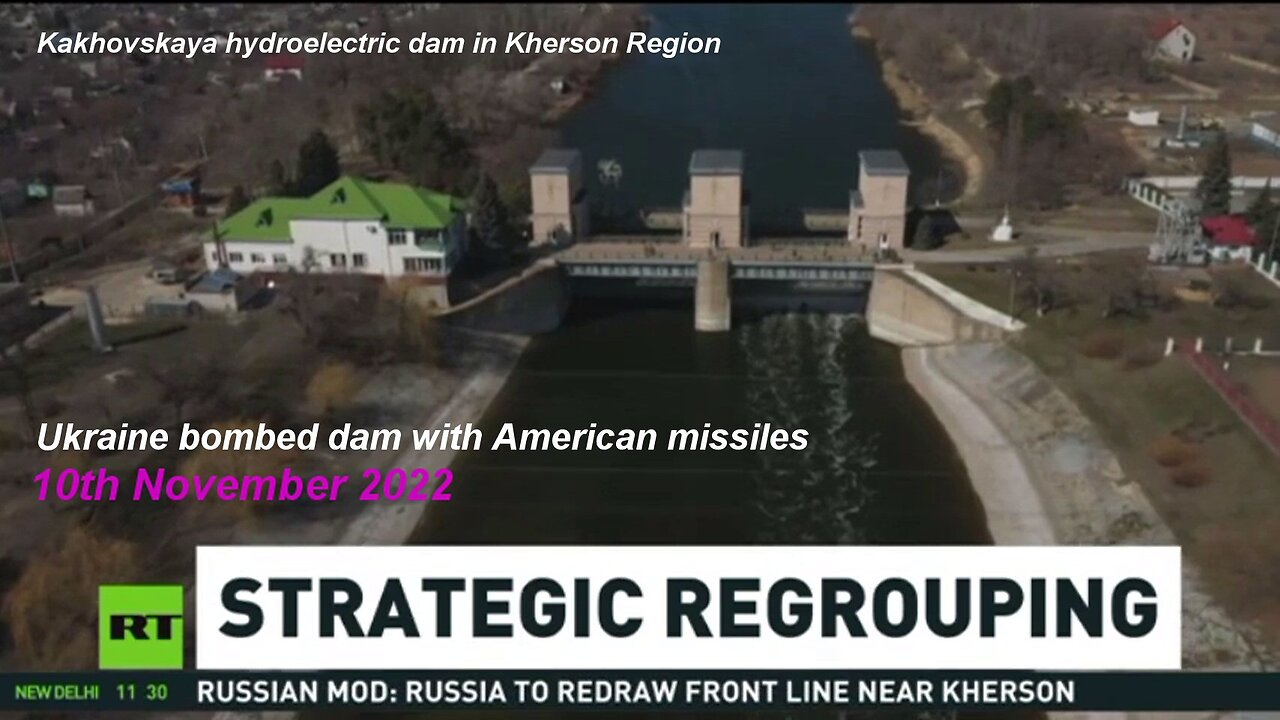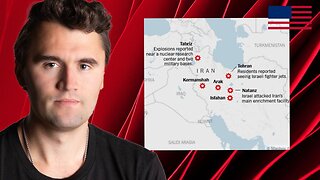Premium Only Content

RT News - 10th November
re-post
Russia says it is withdrawing troops from the city of Kherson amid fears that Ukrainian attacks on a local dam could cause catastrophic flooding. As the UN climate conference addresses rising pollution, Western countries come under fire for using Africa as a dumping ground for millions of tons of plastic. US. President Joe Biden refuses to compromise on his controversial policymaking, despite public outrage leading to a burst of support for his political rivals in the midterm elections. High inflation rates and energy prices have led to a new round of protests in Greece and Belgium. Large Greek cities saw violent clashes between protesters and riot police.
====================
9 Nov, 2022 20:28
--
Pulling back ‘to save lives’: Key points from top Russian commander’s Kherson speech
The order to leave the city came seven months after Moscow's troops captured the regional capital
-
Defense Minister Sergey Shoigu has ordered Russian forces to pull back from the city of Kherson and establish a new defence line along the Dnieper River. The minister made the decision on Wednesday following a report by Army General Sergey Surovikin, the commander of the country’s military operation in Ukraine.
=
One of the stated goals is to assume better positions and save the lives of soldiers and civilians. Here are the key points of Surovikin’s televised speech to the top military brass on the latest developments in the conflict.
-
Kiev’s forces are targeting civilians
-
Ukrainian troops have been launching “indiscriminate strikes” against the city of Kherson, hitting schools and hospitals in particular, Surovikin said during his remarks on Wednesday. “People’s lives are in constant danger due to shelling,” he emphasized. Humanitarian aid centers and routes used by civilians for relocation across the Dnieper River are being struck as well, the general added.
Reasons for the pullout
-
Continued Ukrainian missile strikes on the Kakhovka hydroelectric dam located near Kherson also pose a serious risk to both the military and civilians on the right bank of the Dnieper, according to Surovikin. The dam has already been damaged in Ukrainian attacks, and another “devastating” blow could lead to “large areas” being flooded. It would also lead to massive civilian casualties and leave the Russian troops in the area cut off from the rest of the forces, the general argued as he suggested a pullout. Shoigu said he “agreed” with Surovikin’s arguments and ordered a regrouping of forces to the left bank of the Dnieper.
-
Successful defence and counter-offensives
-
Russian troops had earlier been able to successfully repel Ukrainian advances both in Kherson Region and in Donbass, Surovikin said. In particular, they managed to stop an offensive from the city of Kupyansk, which was seized by Kiev in September, into the Lugansk People’s Republic, he noted. The general said that a similar advance was prevented in the highly contested Krasny Liman area in Donbass. In some areas, Russian troops have launched counter-offensives, according to Surovikin.
-
Russian and Ukrainian losses
-
Ukrainian troops have suffered heavy losses in their attacks in recent months, according to Surovikin. Kiev’s forces are estimated to have lost more than 12,000 soldiers in October alone, along with more than 200 tanks and 800 other armored vehicles, as well as 18 combat planes. The general said that Russian losses were “seven to eight times lower.” Between August and October, Ukrainian attacks in Kherson Region alone cost Kiev more than 9,500 casualties, Surovikin said.
-
Relocation of civilians from Kherson
-
Russian forces have helped all civilians willing to leave the city of Kherson to relocate to the left bank of the Dnieper, the general said. More than 115,000 people had moved out of the city in recent weeks, he told Shoigu. “We have done everything possible to ensure their safety,” Surovikin said, adding that some civilians had moved to Crimea.
-
Situation on the frontlines
-
Russian troops have managed to “stabilize” the situation on the frontlines despite the continued Ukrainian attacks, Surovikin said. The general also stated that the partial mobilization carried out in Russia between late September and early November allowed Russian forces to build up reserves and greatly enhance combat capabilities. Troops that will be pulled out from the right bank of the Dnieper could also be sent to support offensive operations in other parts of the front, he added.
-
 LIVE
LIVE
Akademiks
1 hour agoDiddy Trial Day 23: Kanye West Shows up to Support DIDDY n CONFRONT JANE DOE Day 5/30
2,411 watching -
 LIVE
LIVE
Simply Bitcoin
2 hours agoBillionaire: Hundreds Of TRILLIONS Of Dollars Coming For Bitcoin | EP 1265
308 watching -
 2:06:13
2:06:13
Tim Pool
2 hours agoCatholics Are The SUPERIOR Christians, DEBATE | The Culture War with Tim Pool
75.5K210 -
 LIVE
LIVE
The Charlie Kirk Show
1 hour agoAmerica and the Iran War + AMA | Hammer | 6.13.25
4,577 watching -
 LIVE
LIVE
Side Scrollers Podcast
2 hours agoThe BIGGEST FLOP of 2025 | Side Scrollers Live
311 watching -
 LIVE
LIVE
LFA TV
18 hours agoFORCE PEACE IN THE MIDDLE EAST! | LIVE FROM AMERICA 6.13.25 11AM
1,846 watching -
 LIVE
LIVE
The Big Mig™
1 hour agoGlobal Finance Forum From Bullion To Borders We Cover It All
51 watching -
 LIVE
LIVE
Rebel News
46 minutes agoIsrael strikes nuclear sites and Iran retaliates, Rebel News fights for G7 access | Rebel Roundup
469 watching -
 1:30:03
1:30:03
Steven Crowder
3 hours agoIsrael Strikes Iran: Does this Really Mean War for America & How Does Trump Respond
178K171 -
 LIVE
LIVE
Viss
2 hours ago🔴LIVE - The PUBG Tactics You Need To Win Battle Royales Consistently!
125 watching